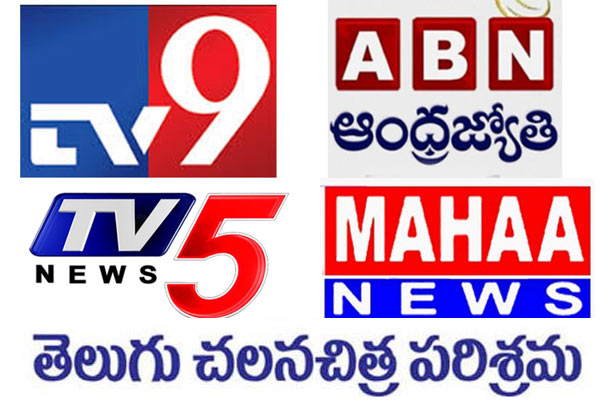
Recent developments suggest Telugu film industry has decided to put some sort of pressure on news channels so that they would not continue to attack film industry and stop making scathing comments on film celebrities. The meeting held by Chiranjeevi has seen most of the film stars attending though top hero like Bala Krishna gave it a miss. Some reports are coming that these stars have decided to go for an unofficial ban on these news channels. This means they will not give any announcement or statement that they have banned these news channels but they will exercise self-restraint and make sure their movie ads, their movie content, their interviews will not be given to these channels. So let us see what happens if this move is implemented
History of Telugu film industry versus media
ETV vs TFI: The first fight between media and TFI happened in 1997 when Dasari Narayana Rao raised red flag against ETV and Ramoji. ETV was the only fulltime channel at that time. The issue at that time was – ETV charging same rate for film trailers and regular commercial ads. Dasari voiced out- film ads should be treated separately as they have high entertainment value to the audience and be charged less than regular commercial ads. Super star Krishna was Movie Artist Association president at that time and he wrote a strong letter to Ramoji Rao which was published in all major newspapers. They requested Ramoji to reduce the tariffs for film ads. But with ETV denying the proposal industry was split in favor of and against Dasari Narayana Rao’s team. However 80% of the industry was with Dasari Narayana Rao and only 20% continued to give their trailers to ETV. This issue was resolved later after advent of many other channels.
Andhra Jyothi : Another instance of this happened with Andhra Jyothi paper and they fought back by writing negative reviews in their paper and exposing dark stories of film industry later this was also result with some sort of amicable solution
Current issue vs previous issues: Now this is the third instance of this issue. However unlike early incidents this time the issue and the background is different than the earlier ones in many ways.
This time the issue is more serious compared to earlier issues as the channels went on to make scathing comments on the film industry as a whole and specifically film people like Pawan Kalyan, Jeevitha and several others. So while the previous issues were of purely commercial nature (regarding tariffs etc), this time the issue is of personal targets and scathing remarks.
While the previous issues don’t have public and common people involved, this time majority of people were disgusted with the cuss words shown in the TVs and vulgarity expressed in the debates.
Moreover, this time it has painted with some political colors too, as Janasena party involved and alleged channels to collude with other parties
Another important difference between the earlier issues and the current issue is that the presence of social media now which was completely absent in earlier cases. Presence of social media is actually giving some courage to those fighting against mainstream media.
Moreover when compared to earlier days now the chunk of revenue that this channels are getting from film industry is significantly high nowadays making them more dependent on film industry. At the same time, film budgets are also high and they want to recover maximum on first couple of days for which they need more media support. In other words, inter-dependency is at its peak now.
How the channels may respond:
Keeping this in background let us see what may happen and how the channels will respond if there is a ban of advertisements to them. First thing is, the response of the news channels will depend on whether this ban will be on all news channels or only on a few channels like TV9 TV5 ABN and Mahaa.
Let us see what happens if the ban is only on these 3-4 channels:
It will not be 100% successful : First things first – such ban will not be 100% successful. What can Chiranjeevi or his team do if RGV or Balayya continue to give ads and in fact they may give their content even more aggressively.
Channels like ABN Andhra Jyothi and TV5 : If such decision is taken by Telugu film industry, definitely these channels will not keep mum. Channels like ABN Andhra Jyothi may resort to the old technique of writing and telecasting negative reviews on the films released and expose darker sides of film industry. Though it is easy to fight such negative reviews and stories exposing dark sides with the help of social media, definitely the people who are targeted by this media will repent the decision of banning advertisements to these channels. At the same time even though film industry is attacking on the revenues of these channels, it is to be noted that this channels are not completely dependent on Telugu film industry for their revenues. Channel like TV5 is also expected to follow the same path of attack in Telugu film industry for their decisions and run stories or debates that put Tollywood in negative side.
Channels like TV9: However by analyzing previous behavior of TV9 in various circumstances, we can say TV9 may not respond the same way as ABN or other channels. TV9’s response is usually considered as more intellectual and more strategic compared to others. For example, instead of running negative stories on Telugu film industry they may run positive stories on artists and technicians doing short films or showing other talents in social media, bring them into lime light, try to embarrass Telugu film industry and say that talent is not confined to those big families of the industry and claim all these bright and talented people are not given chance by these big families and conclude that this ban actually gave them (TV9) good opportunity to bring out the real talents of Telugu people. This is just an example based on TV9’s earlier behavior and this kind of strategic moves may actually swing positive opinion towards TV9. Of course, this is just an example and TV9 may actually come up with any such similar or different strategic moves to embarrass Telugu film industry without actually running negative stories on them.
So, the consequences of this decision will be – partial success, continuous attack by couple of channels and strategic moves to embarrass TFI by other channels.
Let us see what happens if the ban is on all the new channels:
Benefit to entertainment channels: Let us see what will happen if the ban is there on all these news channels instead of only the 3-4 channels. In that case, the channels who are currently supporting this move by TFI may also repent later. But the entertainment channels may be biggest beneficiaries out of this fiasco. Initially, in 90s, film advertisements and trailers were shown more in entertainment channels than the news channels. Do you remember “Bioscope” program in Gemini TV and other similar programs in ETV and MAA TV that dedicated around 30 minutes only to show film trailers. This trend continued for many years. But later what happened is the trend of daily serials in the entertainment channels picked up and the males and youth turned away from the entertainment channels as their prime time was occupied by these daily soaps. So film industry intentionally gave ads in news channels which are watched by males and youngsters who actual moviegoers. Now with the current move, again entertainment channels may get more ads from film industry but they have to retain that position which is actually difficult if they continue to depend on serials in their prime time. If they fail to get audience, TFI’s investment on these channels may not get them sufficient return.
Benefit to websites and social media platforms: Also it is learnt that there has been discussion, in the meeting held by Chiranjeevi, on giving more ads in social media like Facebook rather than depending solely on this mainstream media channels. Of course, giving ads in social media is a better option for Telugu film industry (or any product) as they can target the customers. For example, if the movie is youth oriented they can make sure the advertisements of that movie is displayed only to the youth profiles in facebook and similarly depending on the genre of the movie they can target the audience who like that genre. However it is to be noted here that our Telugu States are not like Kerala that has very high percentage of educated people and very high percentage of social media usage. We still have mass audience and mass movies and many Telugu people do not use social media at all. So, the strategy of using social media may have some benefit of cheaper expenditure but it will not cover the entire audience.
Finally: While all this repercussions and consequences are debated at this moment most of the people think this issue will be resolved at the maximum in couple of months and some sort of amicable solution is reached by both Film Industry and media because they both are interdependent and one can’t survive without other. Because Social media can’t ever take over mainstream media.
There has been this bigger debate that social media prominence is ever more increasing in Telugu States too and that may actually make mainstream media and the news channels obsolete. To analyze this, we can look back at see what debate was done when electronic media came into picture first. In those days many predicted that, with the advent of electronic media print media will fade out gradually because electronic media is giving live updates of the news while we have to wait till next morning to get the news in newspapers. But what actually happened is exactly opposite. Print media actually not only retained their position but also increased their circulation. This is because people still believe that the space allotted in print media for a news is proportional to the gravity of the issue whereas screen time allotted in electronic media for a news is proportional to the sensationalism that the news is carrying. So basically when it comes to authenticity of the news and getting served with right news, people still believe newspapers more than electronic media. The same logic may apply to social media as well. Social media became popular because it has the ability to show all sides of the coin and it is not controlled by any single or group of entities. But the problem is authenticity. Because when there are more voices, it may lead to confusion and people will not know which one is authentic and this may lead to people believing in mainstream media more than social media.
-ZURAN














